Nora Hourani‑Farraj says >> “Marhaba! Hello! April is National Arab American Heritage Month, dedicated to recognizing Arab American contributions since the 1880s.” Although officially acknowledged by the U.S. State Department, Congress, and President Biden in 2021, fewer than 5% of educators or schools mark this observance—largely due to how Arab Americans are counted in census data.
The Invisible Minority: Census Undercount and Identity
Arab Americans hail from the 22 League of Arab States—divided into the Levant, Gulf, and Maghreb regions—and number an estimated 3.7 million across New York, Michigan, California, Florida, and Texas. Yet, Nora Hourani‑Farraj says >> “For decades, Arab Americans have been forced to self‑identify as White on the U.S. Census, robbing them of their ethnic heritage and denying many Afro‑Arabs the choice to claim their identity.” This undercount deprives communities of resources, from health services to educational funding.
Health Disparities and Research Gaps
Because federal research dollars follow census categories, Arab Americans lack disaggregated health data and patient‑centered care opportunities. Nora Hourani‑Farraj says >> “Without proper data, there is no medical research funding to address health disparities in Arab American communities.”
Education Equity: Access to Programs and Support
Arab American students are excluded from diversity‑focused internships, scholarships, and school support services. “Schools can’t identify how many Arab American students they serve,” Hourani‑Farraj explains, “because students cannot select an accurate race or ethnicity on surveys.” This invisibility prevents targeted academic and social support.
You might like:
Savoring Arab Cuisine: Distinct Flavors, Health Benefits, and Global Popularity
Combatting Stereotypes and Media Misrepresentation
While undercounted, Arab Americans are overexposed through negative stereotyping in movies, TV, news, and social media. Nora Hourani‑Farraj says >> “Orientalist tropes reduce Arab characters to caricatures, undermining their rich cultural contributions and fueling prejudice in schools and beyond.”
Integrating Arab American Studies into Curriculum
To foster inclusion, Hourani‑Farraj advocates for Arab American studies across subjects:
- History & Social Studies: Highlight Arab American entrepreneurs, scientists, and civil rights advocates.
- Literature & Arts: Incorporate Arabic poetry, calligraphy, and film.
- Civics & Advocacy: Teach Arab American political empowerment and community organizing.
- Culinary Arts: Celebrate the influence of Arab cuisine on American hospitality.
Nora Hourani‑Farraj says >> “By including Arab American voices and achievements, schools can create an authentic, equitable learning environment where ‘all means all.’ Yallah! (Let’s go.)”
Resources for Educators and Students
- Arab American Heritage Month Toolkit: linktr.ee/dr.nora_hfarraj
- Arab Organizing Academy: www.araborganizing.org/page/arab-american-heritage-month
Author Bio:
Nora Hourani‑Farraj is Director of Community Relations for Chaffey Joint Union High School District and serves as equity representative for an ACSA charter.

